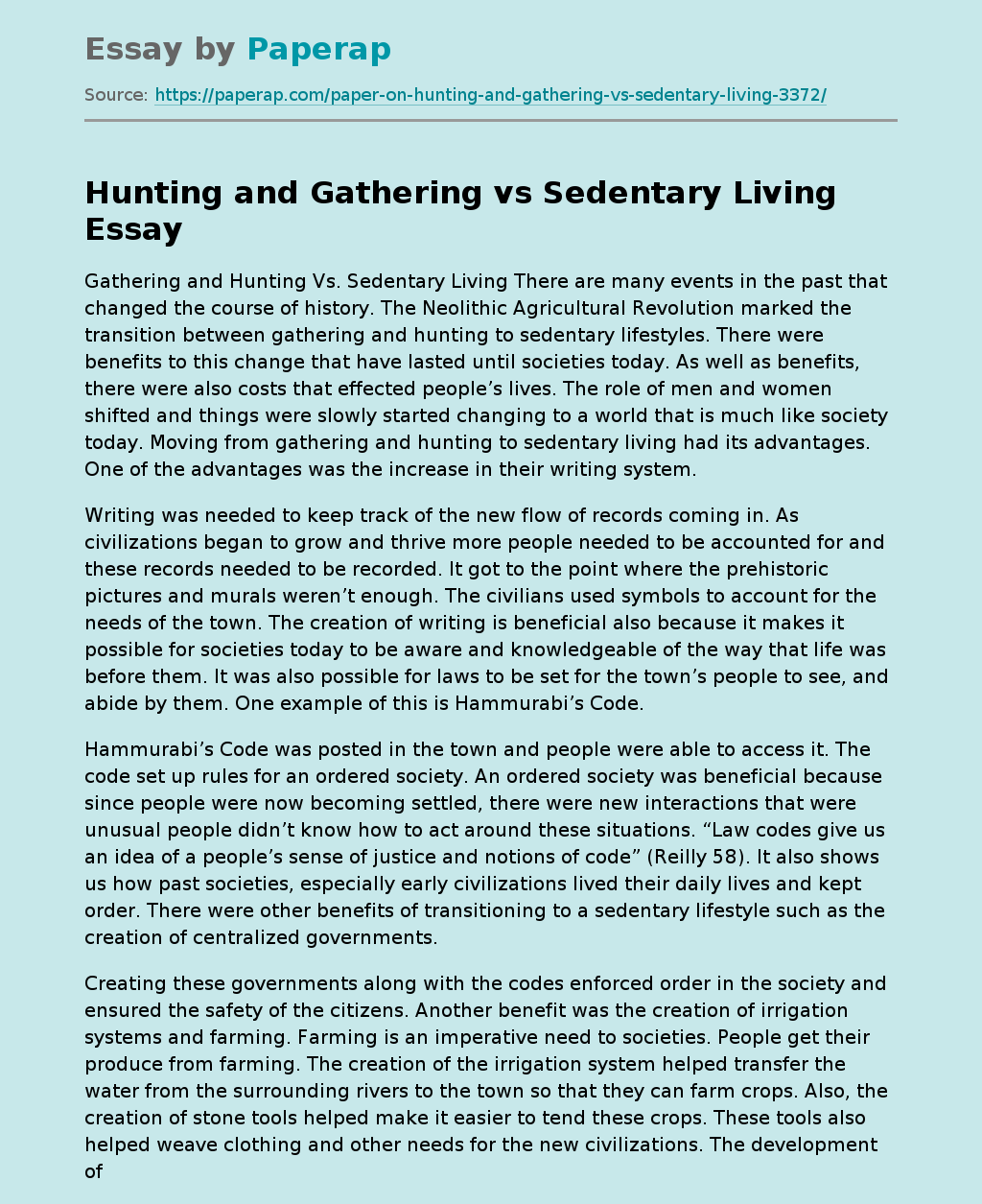Hunting and Gathering vs Sedentary Living
Gathering and There are many events in the past that changed the course of history. The Neolithic Agricultural Revolution marked the transition between gathering and hunting to sedentary lifestyles. There were benefits to this change that have lasted until societies today. As well as benefits, there were also costs that effected people’s lives. The role of men and women shifted and things were slowly started changing to a world that is much like society today. Moving from gathering and hunting to sedentary living had its advantages.
One of the advantages was the increase in their writing system.
Writing was needed to keep track of the new flow of records coming in. As civilizations began to grow and thrive more people needed to be accounted for and these records needed to be recorded. It got to the point where the prehistoric pictures and murals weren’t enough. The civilians used symbols to account for the needs of the town. The creation of writing is beneficial also because it makes it possible for societies today to be aware and knowledgeable of the way that life was before them.
It was also possible for laws to be set for the town’s people to see, and abide by them. One example of this is Hammurabi’s Code.
Hammurabi’s Code was posted in the town and people were able to access it. The code set up rules for an ordered society. An ordered society was beneficial because since people were now becoming settled, there were new interactions that were unusual people didn’t know how to act around these situations.
“Law codes give us an idea of a people’s sense of justice and notions of code” (Reilly 58). It also shows us how past societies, especially early civilizations lived their daily lives and kept order. There were other benefits of transitioning to a sedentary lifestyle such as the creation of centralized governments.
Creating these governments along with the codes enforced order in the society and ensured the safety of the citizens. Another benefit was the creation of irrigation systems and farming. Farming is an imperative need to societies. People get their produce from farming. The creation of the irrigation system helped transfer the water from the surrounding rivers to the town so that they can farm crops. Also, the creation of stone tools helped make it easier to tend these crops. These tools also helped weave clothing and other needs for the new civilizations. The development of farming also was useful for domestication.
By the villagers having an ordered way of growing and collecting food, the animals got drawn to the crops so they are easier to capture and tame. Farming also led to people settling down. People no longer had to go elsewhere to look for crops and herbds because they grew them in the community. Along with benefits, there were costs to moving to a sedentary lifestyle. For example, it changed people’s lifestyles. As gatherers, people were able to move freely and do as they please. There was nobody to tell them what to do such as leaders and tyrants. Once civilizations started to form everything had to be in order so there were changes.
People were being told what to do and they suddenly didn’t have the opportunity to be nomads. This made it hard to adjust to third new society. As shown in the movie N! ai, the Story of a ! Kung Woman, this led to sickness in the village. People were dying left and right. Settling down also led to the introduction of slavery. People were set into social classes and people of the lower class were forced to do the labor that the upper-class didn’t want to do. Slavery was not here when there were Hunter- Gatherers because one more hand meant one more mouth to feed. They did things for themselves. There were also issues of social class.
Citizens were classified by their occupation and what they could bring to the community. The commoners or lower class people with the less respected jobs ere always treated differently no matter what it was. With this shift in society also came the change of the status of men and women. Before settlement women held power and respect. People respected them because they were responsible for the farming which was the main way of acquiring food aside from hunting. Men and females were fairly equal in part. After settlement, the role of a female slowly began to digress and men became more powerful. In Mesopotamia as early as 2300 BCE inscriptions for ‘slave girl’ appear earlier than those translating as ‘slave male” (Reilly 31). There was also a high demand for female slaves as opposed to male slaves. In Marjorie Shostak’s Nisa: The Life and Words of a ! Kung Woman, she revealed how women weren’t able to speak their mind above a man. Men had final say in decisions and women were just there to back it up.
Also young females were forced into marriage by their parents, but as mentioned before, the male parental figure would make the final decisions. In conclusion, the shift from a nomadic lifestyle to settled lifestyles has shown great change in the way that things were ran. The primary and secondary accounts listed in this essay helped readers see the emphasis that this change has on society today. There were sacrifices that people had to make in order to accommodate these changes. Even though one of these sacrifices had to be things such as equality of the sexes, this change still has marked something greater; a gateway for the development of future societies.
Hunting and Gathering vs Sedentary Living. (2017, Dec 07). Retrieved from https://paperap.com/paper-on-hunting-and-gathering-vs-sedentary-living-3372/

